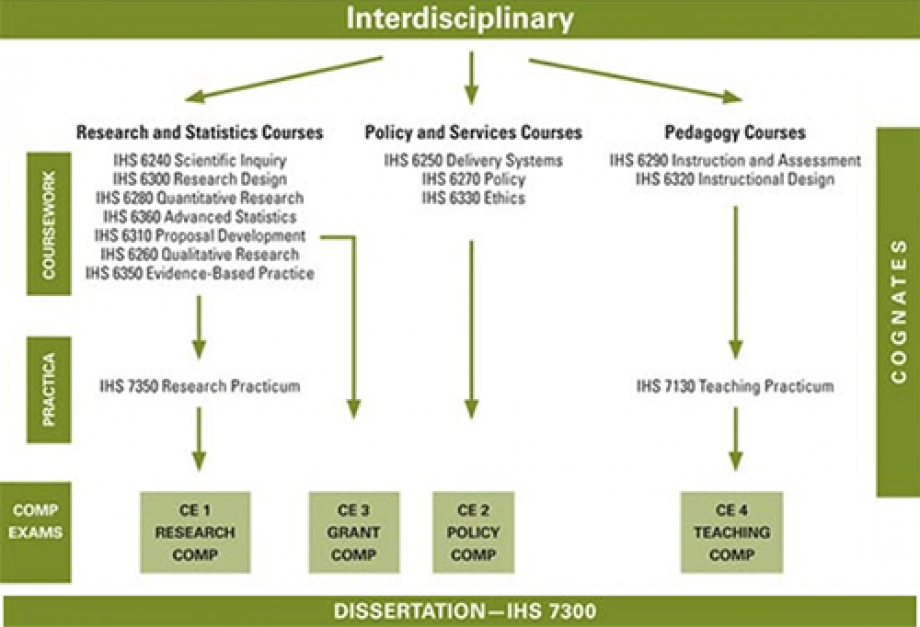Academics
The Ph.D. in Interdisciplinary Health Sciences at Western Michigan University requires 63 hours of course credit, including 12 dissertation credits. Courses generally fall into three categories:
- research and statistics
- policy and service delivery
- pedagogy
More information about our courses, including a sample course schedule, is available on our courses page. Course descriptions are also available in the WMU Graduate Catalog.
Dissertation
You will write a dissertation based on original research focusing on a significant problem in your area of specialization or an interdisciplinary topic. Under the guidance of your dissertation committee, you may elect to write either a traditional five chapter dissertation or use a format consisting of three publishable papers, with integrative introduction and conclusion chapters.
Courses
Courses are delivered virtually (online) or through intensive on-campus sessions. These may include three weekends per semester or one to two continuous week(s) full-time during summer sessions. Courses fall into three categories:
Research and Statistics
- IHS 6240 - Scientific Inquiry in Interdisciplinary Health Sciences
- IHS 6300 - Designing and Conducting Health and Human Services Research
- IHS 6280 - Statistics I in Interdisciplinary Health Sciences
- IHS 6360 - Statistics II in Interdisciplinary Health Sciences
- IHS 6310 - Grant Proposal Development and Management
- IHS 6260 - Qualitative Research Concepts in Interdisciplinary Health Sciences
- IHS 6350 - Evidence-Based Practice and Interdisciplinary Research in Health and Human Sciences
Policy and Service Delivery
- IHS 6250 - Health and Human Services Organization and Delivery Systems
- IHS 6270 - Health and Human Services Policy and Politics
- IHS 6330 - Ethics and Law in Health and Human Services
Pedagogy
- IHS 6290 - College Instruction and Assessment
- IHS 6320 - Innovative Pedagogy and Instructional Design
- IHS 7130 - Practicum in College Teaching in Health and Human Services
Pre-dissertation Seminar
IHS 6970 - IHS Pre-Dissertation Seminar (1 to 6 hours)
Dissertation Research
IHS 7300 - Doctoral Dissertation (12 hours)
Comprehensive examinations
The four comprehensive examinations are competency-based and involve the completion of the following activities and products:
- Research paper and presentation: The submission for publication of a formal research paper based on your research practicum.
- Policy analysis: A written comprehensive analysis of a health care or human services policy.
- Grant application: The development and submission of a competitive external research grant proposal.
- Teaching portfolio: A portfolio reflecting on the teaching of a fully developed course using innovative instructional techniques.
Student competencies
By completion of the program, students are expected to meet 10 exit competencies for providing interdisciplinary leadership in the three faculty functions of research, teaching and service.
- Demonstrate an understanding of health and human service organization and delivery in the United States, including current issues, problems and trends in interdisciplinary practice.
- Demonstrate an understanding of the federal, state and local health and human service policy processes and their impact on health and human services delivery at all levels.
- Demonstrate an understanding of the ethical and moral values important in competent professional practice, research, health and human services organizations, and public policy.
- Work collaboratively with and to understand other disciplines in the health and human services.
- Provide leadership in the health and human services.
- Design, execute and prepare for publication, research that will advance the scholarly base of the health and human services.
- Compete for research/program funding.
- Demonstrate advanced disciplinary knowledge in an area of specialization in the health and human services.
- Apply innovative methodologies to curriculum development, teaching and assessment and to use state-of-the-art instructional technologies.
- Work as a faculty member synthesizing the three functions of research, teaching and professional practice.


